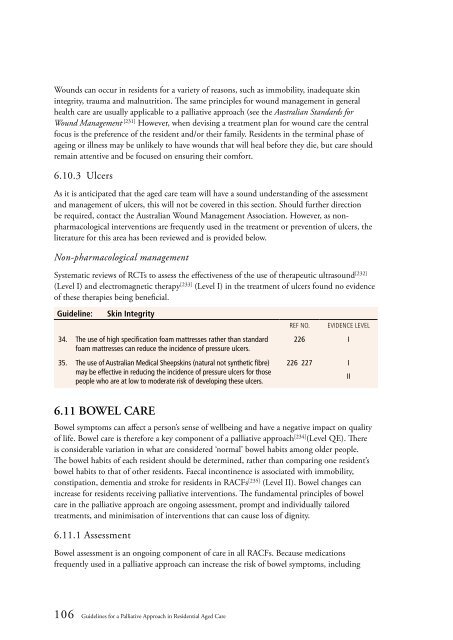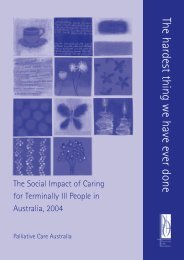Guidelines for a Palliative Approach in Residential Aged Care
Guidelines for a Palliative Approach in Residential Aged Care
Guidelines for a Palliative Approach in Residential Aged Care
Create successful ePaper yourself
Turn your PDF publications into a flip-book with our unique Google optimized e-Paper software.
Wounds can occur <strong>in</strong> residents <strong>for</strong> a variety of reasons, such as immobility, <strong>in</strong>adequate sk<strong>in</strong><br />
<strong>in</strong>tegrity, trauma and malnutrition. The same pr<strong>in</strong>ciples <strong>for</strong> wound management <strong>in</strong> general<br />
health care are usually applicable to a palliative approach (see the Australian Standards <strong>for</strong><br />
Wound Management .[231] However, when devis<strong>in</strong>g a treatment plan <strong>for</strong> wound care the central<br />
focus is the preference of the resident and/or their family. Residents <strong>in</strong> the term<strong>in</strong>al phase of<br />
age<strong>in</strong>g or illness may be unlikely to have wounds that will heal be<strong>for</strong>e they die, but care should<br />
rema<strong>in</strong> attentive and be focused on ensur<strong>in</strong>g their com<strong>for</strong>t.<br />
6.10.3 Ulcers<br />
As it is anticipated that the aged care team will have a sound understand<strong>in</strong>g of the assessment<br />
and management of ulcers, this will not be covered <strong>in</strong> this section. Should further direction<br />
be required, contact the Australian Wound Management Association. However, as nonpharmacological<br />
<strong>in</strong>terventions are frequently used <strong>in</strong> the treatment or prevention of ulcers, the<br />
literature <strong>for</strong> this area has been reviewed and is provided below.<br />
Non-pharmacological management<br />
Systematic reviews of RCTs to assess the effectiveness of the use of therapeutic ultrasound [232]<br />
(Level I) and electromagnetic therapy [233] (Level I) <strong>in</strong> the treatment of ulcers found no evidence<br />
of these therapies be<strong>in</strong>g beneficial.<br />
Guidel<strong>in</strong>e:<br />
Sk<strong>in</strong> Integrity<br />
34. The use of high specification foam mattresses rather than standard<br />
foam mattresses can reduce the <strong>in</strong>cidence of pressure ulcers.<br />
35. The use of Australian Medical Sheepsk<strong>in</strong>s (natural not synthetic fibre)<br />
may be effective <strong>in</strong> reduc<strong>in</strong>g the <strong>in</strong>cidence of pressure ulcers <strong>for</strong> those<br />
people who are at low to moderate risk of develop<strong>in</strong>g these ulcers.<br />
Ref No. Evidence level<br />
226 I<br />
226 227 I<br />
II<br />
6.11 BOWEL CARE<br />
Bowel symptoms can affect a person’s sense of wellbe<strong>in</strong>g and have a negative impact on quality<br />
of life. Bowel care is there<strong>for</strong>e a key component of a palliative approach [234] (Level QE). There<br />
is considerable variation <strong>in</strong> what are considered ‘normal’ bowel habits among older people.<br />
The bowel habits of each resident should be determ<strong>in</strong>ed, rather than compar<strong>in</strong>g one resident’s<br />
bowel habits to that of other residents. Faecal <strong>in</strong>cont<strong>in</strong>ence is associated with immobility,<br />
constipation, dementia and stroke <strong>for</strong> residents <strong>in</strong> RACFs [235] (Level II). Bowel changes can<br />
<strong>in</strong>crease <strong>for</strong> residents receiv<strong>in</strong>g palliative <strong>in</strong>terventions. The fundamental pr<strong>in</strong>ciples of bowel<br />
care <strong>in</strong> the palliative approach are ongo<strong>in</strong>g assessment, prompt and <strong>in</strong>dividually tailored<br />
treatments, and m<strong>in</strong>imisation of <strong>in</strong>terventions that can cause loss of dignity.<br />
6.11.1 Assessment<br />
Bowel assessment is an ongo<strong>in</strong>g component of care <strong>in</strong> all RACFs. Because medications<br />
frequently used <strong>in</strong> a palliative approach can <strong>in</strong>crease the risk of bowel symptoms, <strong>in</strong>clud<strong>in</strong>g<br />
106 <strong>Guidel<strong>in</strong>es</strong> <strong>for</strong> a <strong>Palliative</strong> <strong>Approach</strong> <strong>in</strong> <strong>Residential</strong> <strong>Aged</strong> <strong>Care</strong>
















